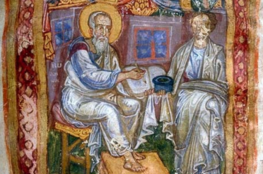Certain traditional Catholics are in a tizzy right now about “things Orthodox,” piously accusing their separated Eastern brethren of being “schismatics” and “heretics.” (“Behold, how they love one another.”) For the record, here is what the late, great Fr. Adrian Fortescue had to say on the matter in his 1912 entry from The Catholic Encyclopedia entitled, “The Eastern Schism.” If only present-day traditionalists could exhibit such care when approaching one of the most complicated and tragic situations in Christian history.
In this deplorable story we notice the following points. It is easier to understand how a schism continues than how it began. Schisms are easily made; they are enormously difficult to heal. The religious instinct is always conservative; there is always a strong tendency to continue the existing state of things. At first the schismatics were reckless innovators; then with the lapse of centuries their cause seems to be the old one; it is the Faith of the Fathers. Eastern Christians especially have this conservative instinct strongly. They fear that reunion with Rome would mean a betrayal of the old Faith, of the Orthodox Church, to which they have clung so heroically during all these centuries. One may say that the schism continues mainly through force of inertia.
In its origin we must distinguish between the schismatical tendency and the actual occasion of its outburst. But the reason of both has gone now. The tendency was mainly jealousy caused by the rise of the See of Constantinople. That progress is over long ago. The last three centuries Constantinople has lost nearly all the broad lands she once acquired. There is nothing the modern Orthodox Christian resents more than any assumption of authority by the oecumenical patriarch outside his diminished patriarchate. The Byzantine see has long been the plaything of the Turk, wares that he sold to the highest bidder. Certainly now this pitiful dignity is no longer a reason for the schism of nearly 100,000,000 Christians. Still less are the immediate causes of the breach active. The question of the respective rights of Ignatius and Photius leaves even the Orthodox cold after eleven centuries; and Caerularius’s ambitions and insolence may well be buried with him. Nothing then remains of the original causes.
There is not really any question of doctrine involved. It is not a heresy, but a schism. The Decree of Florence made every possible concession to their feelings. There is no real reason why they should not sign that Decree now. They deny papal infallibility and the Immaculate Conception, they quarrel over purgatory, consecration by the words of institution, the procession of the Holy Ghost, in each case misrepresenting the dogma to which they object. It is not difficult to show that on all these points their own Fathers are with those of the Latin Church, which asks them only to return to the old teaching of their own Church.
That is the right attitude towards the Orthodox always. They have a horror of being latinized, of betraying the old Faith. One must always insist that there is no idea of latinizing them, that the old Faith is not incompatible with, but rather demands union with the chief see which their Fathers obeyed. In canon law they have nothing to change except such abuses as the sale of bishoprics and the Erastianism that their own better theologians deplore. Celibacy, azyme bread, and so on are Latin customs that no one thinks of forcing on them. They need not add the Filioque to the Creed; they will always keep their venerable rite untouched. Not a bishop need be moved, hardly a feast (except that of St. Photius on 6 Feb.) altered. All that is asked of them is to come back to where their Fathers stood, to treat Rome as Athanasius, Basil, Chrysostom treated her. It is not Latins, it is they who have left the Faith of their Fathers. There is no humiliation in retracing one’s steps when one has wandered down a mistaken road because of long-forgotten personal quarrels. They too must see how disastrous to the common cause is the scandal of the division. They too must wish to put an end to so crying an evil. And if they really wish it the way need not be difficult. For, indeed, after nine centuries of schism we may realize on both sides that it is not only the greatest it is also the most superfluous evil in Christendom.




February 16, 2016
Was it Florovsky that called Orthodox theology a great mansion, of which today we only occupy a few rooms? He’s quite right, especially when those unoccupied rooms have a west-facing window. I mean, over a century ago, Fortescue was filled with the same hyper-pious simplified platitudes which today’s internet Orthodox call their own.
February 16, 2016
I don’t think Fortescue is as bad as he can sometimes come across in print. He held a deep sympathy toward the East and I think his temperament sometimes brought him to expressing a lot of annoyance over theological squabbles which he felt should be overcome. He certainly shared a far more reduced conception of the papacy than most Catholics of his time (or since) and I think a lot of his views would be congenial to the Orthodox today, especially regarding papal meddling in the affairs of other churches.
February 17, 2016
Love that Tertullian quote you open with. Rhetoric? Priceless. 😀